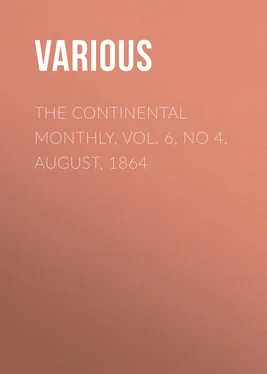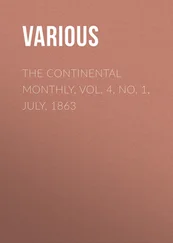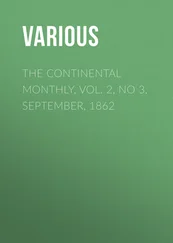Various - The Continental Monthly, Vol. 6, No 4, August, 1864
Здесь есть возможность читать онлайн «Various - The Continental Monthly, Vol. 6, No 4, August, 1864» — ознакомительный отрывок электронной книги совершенно бесплатно, а после прочтения отрывка купить полную версию. В некоторых случаях можно слушать аудио, скачать через торрент в формате fb2 и присутствует краткое содержание. Жанр: foreign_antique, periodic, Языкознание, Политика, foreign_edu, на английском языке. Описание произведения, (предисловие) а так же отзывы посетителей доступны на портале библиотеки ЛибКат.
- Название:The Continental Monthly, Vol. 6, No 4, August, 1864
- Автор:
- Жанр:
- Год:неизвестен
- ISBN:нет данных
- Рейтинг книги:4 / 5. Голосов: 1
-
Избранное:Добавить в избранное
- Отзывы:
-
Ваша оценка:
- 80
- 1
- 2
- 3
- 4
- 5
The Continental Monthly, Vol. 6, No 4, August, 1864: краткое содержание, описание и аннотация
Предлагаем к чтению аннотацию, описание, краткое содержание или предисловие (зависит от того, что написал сам автор книги «The Continental Monthly, Vol. 6, No 4, August, 1864»). Если вы не нашли необходимую информацию о книге — напишите в комментариях, мы постараемся отыскать её.
The Continental Monthly, Vol. 6, No 4, August, 1864 — читать онлайн ознакомительный отрывок
Ниже представлен текст книги, разбитый по страницам. Система сохранения места последней прочитанной страницы, позволяет с удобством читать онлайн бесплатно книгу «The Continental Monthly, Vol. 6, No 4, August, 1864», без необходимости каждый раз заново искать на чём Вы остановились. Поставьте закладку, и сможете в любой момент перейти на страницу, на которой закончили чтение.
Интервал:
Закладка:
Will you have the kindness to follow me, and watch him to-night?
Physician. I will go to him immediately; I am very much interested in the observation of such phenomena.
Relations, Godfather, Physician, the Man, a Nurse—assembled in the sleeping apartment of George Stanislaus.
First Relation. Hush! hush! be quiet!
Second Relation. He is awake, but neither sees nor hears us.
Physician. I beg that you will all remain perfectly silent.
Godfather. This seems to be a most extraordinary malady.
George ( rising from his seat ). God! O God!
First Relation. How lightly he treads!
Second Relation. Look! he clasps his thin hands across his breast.
Third Relation. His eyelids are motionless; he does not move his lips, but what a sharp and thrilling shriek!
Nurse. Christ, shield him!
George. Depart from me, Darkness! I am a child of light and song, and what hast thou to do with me? What dost thou desire from me?
I do not yield myself to thee, although my sight has flown away upon the wings of the wind, and is flitting restlessly about through infinite space: it will return to me—my eyes will open with a flash of flame—and I will see the universe!
Godfather. He talks exactly as his mother did; he does not know what he is saying, I think his condition very critical.
Physician. He is in great danger.
Nurse. Holy Mother of God! take my eyes, and give them to the poor boy!
George. My mother, I entreat thee! O mother, send me thoughts and images, that I may create within myself a world like the one I have lost forever!
First Relation. Do you think, brother, it will be necessary to call a family consultation?
Second Relation. Be silent!
George. Thou answerest me not, my mother!
O mother, do not desert me!
Physician ( to the Man ). It is my duty to tell you the truth.
Godfather. Yes, to tell the truth is the duty and virtue of a physician!
Physician. Your son is suffering from incipient insanity, connected with an extraordinary excitability of the nervous system, which sometimes occasions, if I may so express myself, the strange phenomenon of sleeping and waking at the same time, as in the case now before us.
The Man ( aside ). He reads to me thy sentence, O my God!
Physician. Give me pen, ink, and paper.
He writes a prescription.
The Man. I think it best you should all now retire; George needs rest.
Several Voices. Good night! good night! good night!
George ( waking suddenly ). Are they wishing me good night, father?
They should rather speak of a long, unbroken, eternal night, but of no good one, of no happy dawn for me....
The Man. Lean on me, George. Let me support you to the bed.
George. What does all this mean, father?
The Man. Cover yourself up, and go quietly to sleep. The doctor says you will regain your sight.
George. I feel so very unwell, father; strange voices roused me from my sleep, and I saw mamma standing in a field of lilies....
He falls asleep.
The Man. Bless thee! bless thee, my poor boy!
I can give thee nothing but a blessing; neither happiness, nor light, nor fame are in my gift. The stormy hour of struggle approaches, when I must combat with the few against the many .
Tortured infant! what is then to become of thee, alone, helpless, blind, surrounded by a thousand dangers? Child, yet Poet, poor Singer without a hearer, with thy soul in heaven, and thy frail, suffering body still fettered to the earth—what is to be thy doom? Alas, miserable infant! thou most unfortunate of all the angels! my son! my son!
He buries his face in his hands.
Nurse ( knocking at the door ). The doctor desires to see his excellency as soon as convenient.
The Man. My good Katharine, watch faithfully and tenderly over my poor son!
Exit.
THE NORTH CAROLINA CONSCRIPT
He lay on the field of Antietam,
As the sun sank low in the west,
And the life from his heart was ebbing
Through a ghastly wound in his breast.
All around were the dead and the dying—
A pitiful sight to see—
And afar, in the vapory distance,
Were the flying hosts of Lee.
He raised himself on his elbow,
And wistfully gazed around;
Till he spied far off a soldier
Threading the death-strewn ground.
'Come here to me, Union soldier,
Come here to me where I lie;
I've a word to say to you, soldier;
I must say it before I die.'
The soldier came at his bidding.
He raised his languid head:
'From the hills of North Carolina
They forced me hither,' he said.
'Though I stood in the ranks of the rebels,
And carried yon traitorous gun,
I have never been false to my country,
For I fired not a shot, not one.
'Here I stood while the balls rained around me,
Unmoved as yon mountain crag—
Still true to our glorious Union,
Still true to the dear old flag!'
Brave soldier of North Carolina!
True patriot hero wert thou!
Let the laurel that garlands Antietam,
Spare a leaf for thy lowly brow! 1 1 From an incident narrated in the newspaper account of the battle of Antietam. The reader will be reminded by it of Mrs. Browning's 'Forced Recruit at Solferino.'
DOES THE MOON REVOLVE ON ITS AXIS?
As this question has elicited considerable discussion, at various times, the following may be considered in elucidation.
A revolution on an axis is simply that of a body turning entirely round upon its own centre. The only centre around which the moon performs a revolution is very far from its own proper axis, being situated at the centre of the earth, the focus of its orbit, and as it has no other rotating motion around the earth, it cannot revolve on its own central axis.
A body fixed in position, or pierced and held by a rod, cannot revolve upon its centre, and when swung round by this rod or handle, performs only a revolution in orbit, as does the moon. The moon, during the process of forming a solid crust, by the constant attraction of the earth upon one side, only, became elongated, by calculation, about thirty miles (from its centre as a round body) toward the earth; consequently, by its form, like the body pierced with a rod, is transfixed by its gravitation, and, therefore, cannot revolve upon its own central axis.
The difference of axial revolution of a wheel or globe, is simply that the former turns upon an actual and the latter upon an imaginary axle, placed at its centre, Now, by way of analogy, fasten, immovably, a ball upon the rim of a revolving wheel, and then judge whether the ball can perform one simultaneous revolution on its own axis, in the same time that it performs a revolution in orbit, made by one complete turn of the wheel; and if not (which is assuredly the case, for it is fixed immovably), then neither can the moon perform such revolution on its axis, in the same time that it makes one revolution in orbit; because, like the ball immovably fixed upon the rim of the wheel, it, too, is transfixed by gravitation, from its very form, as if pierced with a rod, whose other extremity is attached to the centre of the earth, its only proper focus of motion, and, therefore, cannot revolve upon its own central axis.
A balloon elongated on one side, and carrying ballast on that side, would be like the moon in form, and when suspended in air, like the moon, too, in having its heaviest matter always toward the centre of the earth. Now let this balloon go entirely round the earth: it will, like the moon, continue to present the weightiest, elongated side always toward the centre of the earth; it, consequently, like the moon, cannot revolve upon its own central axis, as gravitation alone would prevent this anomaly, in both cases.
Читать дальшеИнтервал:
Закладка:
Похожие книги на «The Continental Monthly, Vol. 6, No 4, August, 1864»
Представляем Вашему вниманию похожие книги на «The Continental Monthly, Vol. 6, No 4, August, 1864» списком для выбора. Мы отобрали схожую по названию и смыслу литературу в надежде предоставить читателям больше вариантов отыскать новые, интересные, ещё непрочитанные произведения.
Обсуждение, отзывы о книге «The Continental Monthly, Vol. 6, No 4, August, 1864» и просто собственные мнения читателей. Оставьте ваши комментарии, напишите, что Вы думаете о произведении, его смысле или главных героях. Укажите что конкретно понравилось, а что нет, и почему Вы так считаете.












